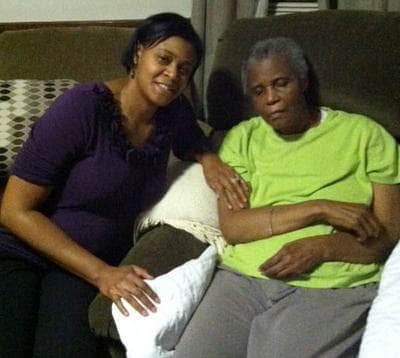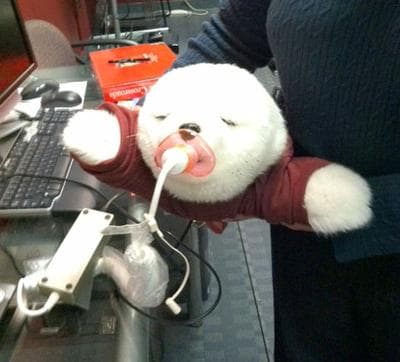Advertisement
Preparing For An Alzheimer's 'Tsunami'
ResumeMany experts use the word "tsunami" to describe the expected increase in cases of Alzheimer's disease in the near future. Some research suggests the number of Alzheimer’s patients could triple — some say quadruple — by 2050. Elder services providers say nobody is preparing for this, even though the explosion in Alzheimer's as baby boomers age will affect patients, their families, communities and potentially the entire U.S. health care system.
"It's the sort of crisis that policymakers, clinicians know is happening," said Len Fishman, CEO of Hebrew Senior Life, the largest provider of elder care services in Massachusetts. "I don’t think the country has absorbed it yet and in a couple of decades when the number of Alzheimer’s cases has doubled, people will look back and say, 'Why didn't we know this was coming?' "
Many families already know it's a crisis and say something is going to have to change-- if not for them, then for the millions of people who will be caring for a loved one with Alzheimer's in the very near future.

Bernice Osborne Pollard takes care of her 74-year-old mother, Mary Osborne, who needs constant care. Mary is in the late stages of Alzheimer's disease — she's immobile, non-responsive and unable to do anything on her own. The living room of Mary's Dorchester apartment has been converted to a one-room nursing home where Mary spends much of the time in an electric reclining chair.
"It's hard to watch your mom decline before your eyes," Bernice said. "She used to be this lively woman and now she sits in a chair all day. It's been difficult."
Bernice and other family members have been caring for Mary since she was first diagnosed with dementia nine years ago. Bernice and her sister live in the other two apartments in this three-family home, and Bernice has reduced her work hours to part-time. But even so, Bernice needs round-the-clock help to feed, dress, bath and transport her mother.
"We were thinking about it the other day and said it probably takes about 12 or 13 people to care for my mother to keep her home," Bernice said.
National statistics suggest that on average it takes three to four people to help care for each Alzheimer's patient living at home, and some 11 million Americans are now helping to care for the estimated 70 percent of Alzheimer's patients who stay at home. And that does not include paid caregivers. Donna Allen, a dementia program manager at Kit Clark Senior Services in Dorchester, where Mary goes to an adult day care program three days a week, says these programs help the patients and provide respite for caregivers.
"She has exercise and the staff tries to work one-on-one with her," Allen said. "Mary isn’t really able to initiate things so the staff will walk and talk with her."
On average these programs cost between $60 and $85 a day. Over the past five years, participation in adult day care programs has increased by more than a third in Massachusetts and it's expected that demand for these programs will soon outpace supply. Jamie Seagal, president of Rogerson Communities, says his adult day care programs are usually full already. So why isn't he adding more?
With limited nursing home beds and the high costs of assisted living, experts predict that most Alzheimer’s patients will be cared for at home in the coming years.
"One of the reasons that we can’t expand right now is because we’re at a limit of our ability to subsidize," Seagal said. "The Medicaid reimbursement does not cover our costs; in fact we lose $15 to $20 per person per day.”
While Medicaid covers the costs of Alzheimer's programs for some low-income seniors, Medicare does not. So many patients and their families have to privately pay for Alzhiemer's care until they've spent enough of their money to qualify for Medicaid. Medicaid does pay for long-term nursing home care, but not the less restrictive assisted living for seniors. There are about 13,000 assisted living units in Massachusetts now. But with more than 900,000 state residents over the age 65 and that number growing fast, more will be needed. Assisted living providers realize this and are creating special Alzheimer's units.
"Ten years ago we had 12 residents in memory support and today we have 150 residents ... and we're full," said Bob Larkin, president of Compass on the Bay assisted living in South Boston.
Larkin's assisted living facility is what's known as a continuing care retirement community. That means a senior enters while still able to live independently and, as their condition deteriorates, services and programs are added. Much of the programming here is specifically designed for Alzheimer's patients, like classes on Italy or art or history. Compass on the Bay has shifted its approach to Alzheimer’s care by emphasizing continued learning and reducing the use of medications.
Other assisted living providers are also tailoring their programs for Alzheimer's patients.
[sidebar title="By The Numbers: Alzheimer's In America" width="360" align="right"]
- 5.4 million Americans have Alzheimer's
- Alzheimer's is the U.S.' sixth leading cause of death
- Alzheimer's care costs $183 billion annually...
- ...by 2050, the cost is expected to be $1.1 trillion
- Nearly 1 in 8 Americans over 65 will get the disease...
- ...by age 85, nearly 1 in 2 will get the disease
- From The Alzheimer's Association. See also: "Alzheimer's 101"
[/sidebar]
"Our programming has to be updated," said Betsy Ross, executive director of Rogerson House assisted living. "We’re not going to always do music like 'A Bicycle Built For Two' anymore because people aren’t going to relate to that. We’re going to relate to The Beatles and The Rolling Stones and Roy Orbison and all that."
On average, an assisted living apartment in Massachusetts costs about $6,000 a month, so without changes in either government funding or insurance, many seniors will not be able to afford this option for care.
"My big concern is: what about the rest of us poor schmoes who are going to need lots of support, who may not have hundreds of thousands of dollars to dwindle down for care in assisted living?" asks Bob Stern, director of Boston University's Alzheimer’s Disease Center Clinical Core. He advocates more government support for senior housing to help accommodate the expected wave of Alzheimer's patients.
Even nursing home operators say more financial support for senior housing would save money in the long run because the costs of assisted living are about half the average $10,000 a month for a nursing home.
Fishman, of Hebrew Senior Life, says there should be a complete restructuring of Alzheimer's care.
"There are many people who could be supported in assisted living for less who end up going to a nursing home because Medicaid is available," Fishman said. "So we are actually spending more money on their care and we are accelerating their decline.”
So with a limited number of nursing home beds and the high costs of assisted living, experts predict that most Alzheimer’s patients will be cared for at home in the coming years. That is where much of the research is now focused — on efforts to make caregiving easier and to make Alzheimer's patients more comfortable.

Efforts as simple as Paro, a robotic pet seal used to comfort Alzheimer's patients. Research scientist Lisa D'Ambrosio, with MIT's AgeLab, says Paro helps Alzheimer's patients connect and feel less agitated.
"He was designed with the weight of an infant in mind," D'Ambrosio said. "Underneath his hypoallergenic fur are sensors, cameras in the eye to make sure you're looking at him, whiskers which are sensitive as well. Paro has been shown to comfort Alzheimer's patients."
The MIT aging lab is also testing devices to monitor a patient's use of medication and movement. These allow caregivers to remotely log on and make sure a patient in the early stages of Alzheimer's is taking medications and is safe.
But for those caring for loved ones in the late stages of the disease, like Bernice Osborne Pollard, something is going to have to change.
"The system is definitely not set up to help families and loved ones," she said. "I talked to so many people in the same situation who are unable to get help, which is why we all help each other. A lot of months we're robbing Peter to pay Paul and Paulette and Suzie and everyone else too. So I don't know."
Policymakers are starting to take steps. The first national action plan for Alzheimer's became law just this year and a federal advisory panel is developing a national strategy to support not only Alzheimer's patients, but their caregivers as well. But with the population aging rapidly and with someone in America developing Alzheimer's every 69 seconds, experts say action can't come fast enough.
This program aired on November 14, 2011.
